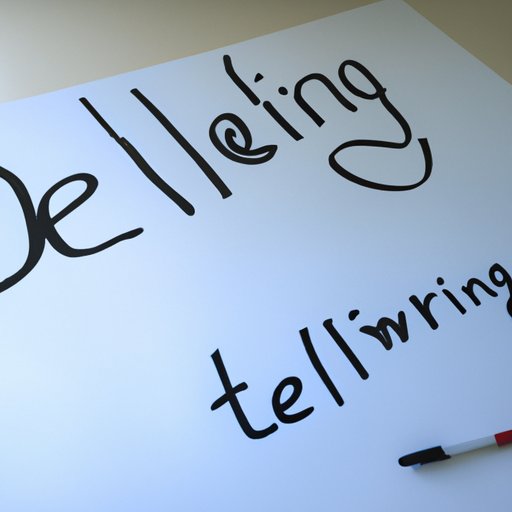Introduction
Reflection in writing is a form of analysis that involves taking a deeper look at an event, experience, or thought process. It requires introspection and contemplation, allowing the writer to explore their feelings, reactions, and interpretations of the subject. Reflection allows writers to examine and unpack their ideas, drawing on past experiences and forming new insights.
The purpose of this article is to explore the power of reflection in writing. We will take a look at the benefits of utilizing reflection as a writing technique, different forms of reflection, and how to incorporate it into your writing practice. We will also discuss how reflection can be used to enhance academic writing and to foster personal and professional growth.
Exploring Reflection as a Writing Technique
Writing with reflection offers many benefits. It can help writers understand their own thoughts and emotions more deeply, as well as gain insight into the thoughts and feelings of others. Reflection can also help writers develop their analytical and critical thinking skills, as well as improve their understanding of course material.
There are several different forms of reflection that can be used in writing. These include narrative reflections, which involve recounting a story; descriptive reflections, which involve providing detailed descriptions; and reflective conversations, which involve exploring questions about a particular topic.

Harnessing the Power of Reflection for Writing Success
In order to make the most of reflection in writing, it is important to understand how to utilize it effectively. The first step is to identify the goal of your reflection. Are you trying to explore a particular concept or idea? Are you looking to gain a better understanding of your own thoughts and feelings? Once you have identified the purpose of your reflection, you can begin to craft your piece accordingly.
Examples of reflection that can enhance writing include analyzing a past experience, exploring a particular theme, and evaluating a particular argument. By reflecting on these topics, writers can gain greater insight into the material they are discussing and convey their thoughts more clearly.
Developing Self-Awareness Through Reflection Writing
Reflective writing can be an invaluable tool for developing self-awareness. By reflecting on their thoughts and feelings, writers can identify their strengths and weaknesses, as well as gain insight into their motivations and behavior. This can be especially useful for those seeking to improve their writing skills.
Reflective writing can also help writers become more aware of their own biases and preconceived notions. By recognizing and challenging their assumptions, writers can learn to think more critically and objectively about their work.

How to Incorporate Reflection into Your Writing Practice
Incorporating reflection into your writing practice can be a great way to enhance your work. When planning your reflections, it is important to consider the amount of time and space available for each one. You should also decide who will be involved in the reflection, as well as how you will use the reflection to inform your writing.
Once you have planned out your reflections, you can begin to apply them to your work. This could involve reflecting on a particular scene or character in a story, exploring the implications of an argument, or examining the implications of a certain event. Reflective writing can also be used to evaluate your writing style and techniques.

Using Reflection in Academic Writing
Reflective writing can be a powerful tool for enhancing academic writing. By reflecting on course material, students can gain a deeper understanding of the material and develop their critical thinking skills. This can also help them to write more engaging and informative essays and papers.
Reflective writing can also be used to assess and evaluate academic performance. Through self-reflection, students can identify areas where they need to improve and set goals for their future academic success.
Reflective Writing: A Tool for Personal and Professional Growth
Reflective writing can be a powerful tool for both personal and professional growth. It can help writers gain a better understanding of themselves, as well as cultivate self-improvement. Reflective writing can also help writers develop their communication skills, as well as foster professional development.
By using reflective writing to analyze their past experiences and evaluate their current situation, writers can gain greater insight into their abilities and potential. This can help them make informed decisions about their future, as well as enhance their overall well-being.
Conclusion
In conclusion, reflection in writing is a powerful tool that can be used to enhance writing skills, develop critical thinking, and aid personal and professional growth. It is an effective way to gain a deeper understanding of oneself and one’s work, as well as to foster creativity and imagination. By incorporating reflection into your writing practice, you can unlock the potential of your writing and take your work to the next level.
This article has explored what reflection in writing is and how it can be used to benefit writers. We have discussed the benefits of reflection, different forms of reflection, and how to incorporate it into your writing practice. We have also looked at how reflection can be used to enhance academic writing and to foster personal and professional growth.
(Note: Is this article not meeting your expectations? Do you have knowledge or insights to share? Unlock new opportunities and expand your reach by joining our authors team. Click Registration to join us and share your expertise with our readers.)
